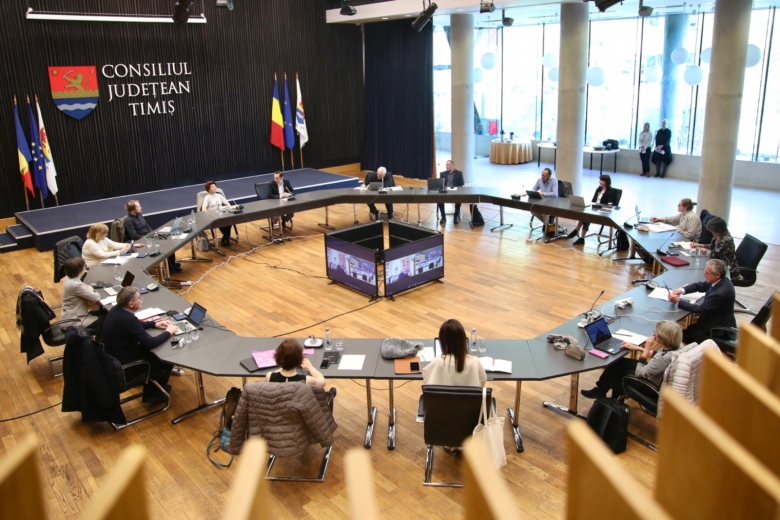Call for Candidates: Selection Committees of the European Heritage Awards / Europa Nostra Awards 2024
The 2024 Call for Entries of the European Heritage Awards / Europa Nostra Awards was launched on 13 June.

We now invite candidates for the five Selection Committees of the European Heritage Awards / Europa Nostra Awards 2024.
What do the Selection Committees do?
The members of the five Selection Committees, one per category of entry, play a crucial role as they will be responsible for evaluating all the eligible entry dossiers in their respective category and selecting a shortlist of entries.
The selection procedure works as follows:
- All entries to the European Heritage Awards / Europa Nostra Awards are first evaluated and shortlisted by the Selection Committees. There will be a maximum of 60 shortlisted projects among all of the five categories of entry.
- The shortlisted entries are further evaluated by local assessors who provide a report to the Heritage Awards Jury.
- The Heritage Awards Jury then selects the final winners. The Heritage Award Jury 2024 will be composed of the five Chairs of the Selection Committees and other international experts, appointed by the Board of Europa Nostra upon invitation.
The duration of the online meeting of the selection committees depends on the number of entries per category. Two full days are usually required for a successful screening and discussion of the dossiers. The meetings will take place online between the beginning of January and mid-February 2024.
Being part of a Selection Committee brings several benefits, among which becoming part of a valuable European network of experts and the opportunity of having a privileged perspective on the state of European heritage practice across the continent. No remuneration is provided.
Past members of the selection committees have said that being part of a Selection Committee means “Being able to know projects from all over Europe and to learn with them. We can find excellent good practices and, by having critical thinking on the projects, we can also improve the projects and work we are engaged in as professionals.”
The following are the five categories of Awards that will be necessary to evaluate dossiers submitted in the five categories of entry:
- Conservation & Adaptive Reuse
Outstanding projects aiming at the conservation, regeneration, and adaptation to new uses of cultural heritage, including cultural landscapes.
- Research
Innovative research projects which lead to tangible effects for the safeguarding and enhancement of cultural heritage and/or to improve the access, enjoyment, and understanding of heritage assets by communities.
- Education, Training & Skills
Exemplary initiatives related to cultural heritage with the aim of fostering knowledge transfer, capacity-building and/or high-level specialised traditional skills and crafts.
- Citizens’ Engagement & Awareness-raising
Outstanding heritage-led achievements which foster social cohesion, inclusion, and multicultural dialogue, nurture a sense of place, belonging and acknowledge diversity and identities, and stimulate citizens’ engagement, ownership, and civic responsibility.
- Heritage Champions
Individuals or organisations whose action demonstrates an exceptional level of dedication and civic engagement for the safeguarding and enhancement of cultural heritage.
Who can apply to be a member of a Selection Committee?
- Candidates should have proven expertise and/or experience related to one or more aspects of the broader field of cultural heritage (tangible, intangible, digital).
- International and/or European experience is an asset.
- Working proficiency in English is required, as the entry dossiers are presented only in English.
- It is important that the candidate is prepared to spend some time studying the dossiers ahead of the meeting of the selection committee.
- The Selection Committees will study the dossiers via an online platform so access to the internet and a computer will be necessary.
- In case past members of the Selection Committees are interested in continuing their role, they are encouraged to submit their application.
For all new candidates (those who have never served as a member of the Heritage Awards Juries or Selection Committees in the past), an endorsement will be necessary.
A new candidate for the Selection Committee can be endorsed by:
- a Vice President of Europa Nostra
- a member of the Board of Europa Nostra
- a member of the Council of Europa Nostra
- a former member of the Heritage Awards Jury/ Selection Committee
- a member of the European Heritage Alliance
- an associate or member organisation of Europa Nostra
- a partner of the European Heritage Hub
In order to reflect the diversity of Europe’s residents among the Selection Committees, applications from people of all races, faiths, genders/gender identities, ages, and sexual orientations, as well as people with disabilities are encouraged.
How do candidates apply?
Applications can be submitted by 13 August via this online form.
The Selection Committees will be appointed by the Board of Europa Nostra. Candidates will be informed of the outcome of their application by mid-September 2023.
When making the selection, the Board will endeavour to ensure the following:
- Complementarity of competencies and experiences.
Europa Nostra will ensure that each of the appointed members of the Selection Committees has the appropriate field of interest and expertise and is therefore assigned the most suitable category to evaluate.
- A balanced representation of genders
- A balanced geographical distribution
In case of any questions regarding the European Heritage Awards / Europa Nostra Awards or the selection procedure, please contact Elena Bianchi, Programme Manager at eb@europanostra.org.






